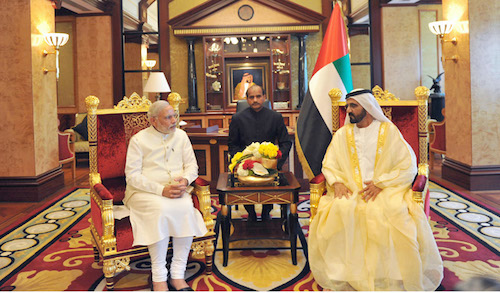As the new Modi government tightens up bureaucratic systems with new initiatives to facilitate business, recognizing India’s potential for investment, the United Arab Emirates is tapping new opportunities and encouraging the kingdom's investment institutions to open their coffers in India. A major step in this direction is the establishment of a $75-billion UAE-India Infrastructure Investment Fund during the Aug. 17 meeting of Prime Minister Narendra Modi with UAE Crown Prince Mohamed Bin Zayed Al Nahyan.
The fund will support investment in India’s plans for rapid expansion of next-generation infrastructure, especially in railways, ports, roads, airports and industrial corridors and parks. Renewable-energy projects also are expected to figure, with focus on the International Conference on Climate Change in Paris in Decemeber 2015, which should produce an effective agreement that will include provision of means and technologies to developing countries to transition to clean energy.
With India the UAE’s second-largest trading partner, and the UAE India’s third-largest partner, the agreement also will facilitate Indian companies' participation in infrastructure development in the UAE.
“As India accelerates economic reforms and improves its investment and business environment, and UAE becomes an increasingly advanced and diversified economy, the two countries have the potential to build a transformative economic partnership,” said the joint statement. “India-UAE ties are set to grow at a historic pace. We discovered new areas to cooperate and I invited investors to see the changes in India,” tweeted Modi, a man known for his speed in governance.
“The direct impact will be that a lot of companies which are in the infrastructure and related fields will directly benefit, as there will be a lot of opportunities coming their way. The indirect benefit will be that this investment by the UAE will support the ‘Make in India’ campaign, which in turn will bring in a lot of foreign companies to set up shop here,” Ashish Tandon, managing director, Egis India, told Construction.
With India expected to be one of the most populated countries in the world in the near future, “planned infrastructure is the need of the hour. … The Government’s smart-city initiative … [and] Inland waterways will offer an alternative and economical mode of transportation in India. Water scarcity is of concern, as is ensuring clean drinking water—that will be a huge social challenge,” said Tandon.
To achieve economic growth through manufacturing under the ‘Make in India’ initiative, there is need for an excellent road, maritime and sustainable-energy infrastructure in place to support smooth transportation of the goods, added Tandon.
It is clear that things are moving. As a follow-up to the Dubai agreement, at a meeting held in Delhi on Aug. 25, Modi said: “With enough funds now being provided for infrastructure creation, the onus is on the concerned ministries to ensure that these outlays are converted into proportionate outcomes.” Modi reviewed the progress of solar-energy-related projects, especially those related to railway stations and airports. He also called for priority to be assigned to road links with Nepal, Bhutan and Bangladesh.
Already, Dubai-based DP World has reiterated its commitment to India’s development. It has invested over $2 billion through its operations in the country, where it supports over 32% of India’s container trade. A market leader in Indian container-terminal operations, DP World operates five container terminals in India, with a total capacity of 4.8 million TEU and quay length of 3,167 meters, a container rail service across the country and container freight stations.

